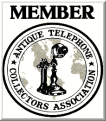|

| There are a lot of images on
these pages, please be patient when downloading. |

|
I invite you to click on the small
picture to see a larger version.
These photographs are not to scale
| C. 1880's - 1930's - These "Dark Lanterns" (also called
"Flashlights" & "Dead Flame Lanterns") were the portable
lighting of the policeman in the later 1800's until the
early 1930's. There were various manufacturers in the U.S.
and England. Early on, the fuel used was whale oil followed
later by coal oil. There were different variations produced
over the years although all very similar. Most were made of
tin with a japanned finish or for a few more dollars you
could opt for brass. Either way, the metal was very thin to
keep them lightweight. They had "bullseye" lens to direct
the light in a specific direction which was available in 2
3/4" and 3". Most later models had 3" lens. A sliding
light shield was used to black out the light and was
operated by either a small sliding knob near the bottom edge
of the light or later, a lever at the top where the thumb
was used allowing for single hand use. These flashlights
could be attached to the belt as well as heldheld.
Pictured are both tin and brass types and both have a 2
3/4" lens. The tin model is 7" tall with the sliding knob to
shield the light. The brass one is 8" tall with the thumb
operated shield lever at top. Additionally, they both use
different style font and wicks. |
| This early Gamewell Call Box was
manufactured prior to 1911 when the Gamewell Co. was at its
original location in New York, NY. Very large and heavy box
at more than 80 pounds, measuring greater than 20"H x 13"W
x7 1/2"D. It is equipped with a rare 7 position selector.
Equipped with an all
metallic mouthpiece and a very rare receiver cap
marked GAMEWELL D43821
Note: This specific call box was used
in Philadelphia, PA. |
| This Gamewell Call Box was manufactured after the
Gamewell Co. had moved to Newton, Mass. Most likely this one
was produced sometime between 1928 and 1937. It is slightly
smaller and somewhat lighter than the earlier model. It is
equipped with a later style Western Electric E1 handset.
Note: The number plate on the door is a reproduction
using Sgt. Joe Friday's badge number. Remember Dragnet?
Currently trying to obtain an original. |
| Interesting enough, I live in a very small northwestern
town with a population of under 1000. I experienced a
plumbing leak and the Water Company representative came to
the house to locate the leak. He used one of these. I
thought, I would love to have one as it is a tool unlikely
to be used anywhere else in this day and age. I found one so
I had to add it to the site. It is so simple, you remove
the cork protector from the pointed end of the rod, placing
the point of the rod against the outside of the pipes, put
your ear against the telephone receiver and listen for the
leak. The simple diaphragm inside the cap amplifies the sound. |
phonemandave.net/misc.
telephone/police related
|
